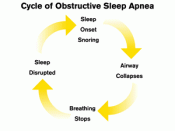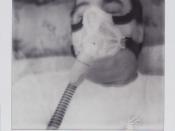Sleep, why do people sleep at all? Why can't we just stay awake?
Some biologist suggest that sleep provides the opportunity to conduct
self-repair and purge the body of it's waste that has built up during
the day's activity. Nevertheless, the body is capable of repairing
itself and disposing of wastes during waking hours, so sleep in a way
really isn't necessary for routine maintenance (e.g., urinating, etc.).
Dr. Quentin Regestein, lead sleep and sleep disorders researcher at
Harvard Medical School also believed that sleep kept our distant ancestors
out of harms way during the night when they could not see as well as
their night roaming predators.
Sleep is regulated by a connected series of structures in the
deep midline areas, and along other way stations that extend through
the central axis of the brain, these structures relay information about
things that affect sleep. In Dr. Regestein notes, he spoke of experiments
that were performed by researchers.
The researchers he spoke of would
destroy specific brain structures of a lab animal and then note how
the animal slept. For instances, in one lab animal the researcher
cut through the axis of the brain at one level, which would prevented
the animal from awakening; showing that brain structures below the
level of the cut were responsible for awakening the lab animal.
The American Sleep Disorders Association (ASDA), Association for
the
Psychophysiological Study of Sleep (APSS), Association of Sleep Disorder
Centers (ASDC), and the American Psychiatric Association (APA) has
studied sleep and sleep disorders since the early 1970's. Out of all
the sleep disorders currently being studied, sleep apnea has gain world
wide attention, affecting over 15 million people. Apnea, derived from
the Greek word 'want to breath.' Sleep Apnea (cessation of air flow
at the mouth for greater than 10...


